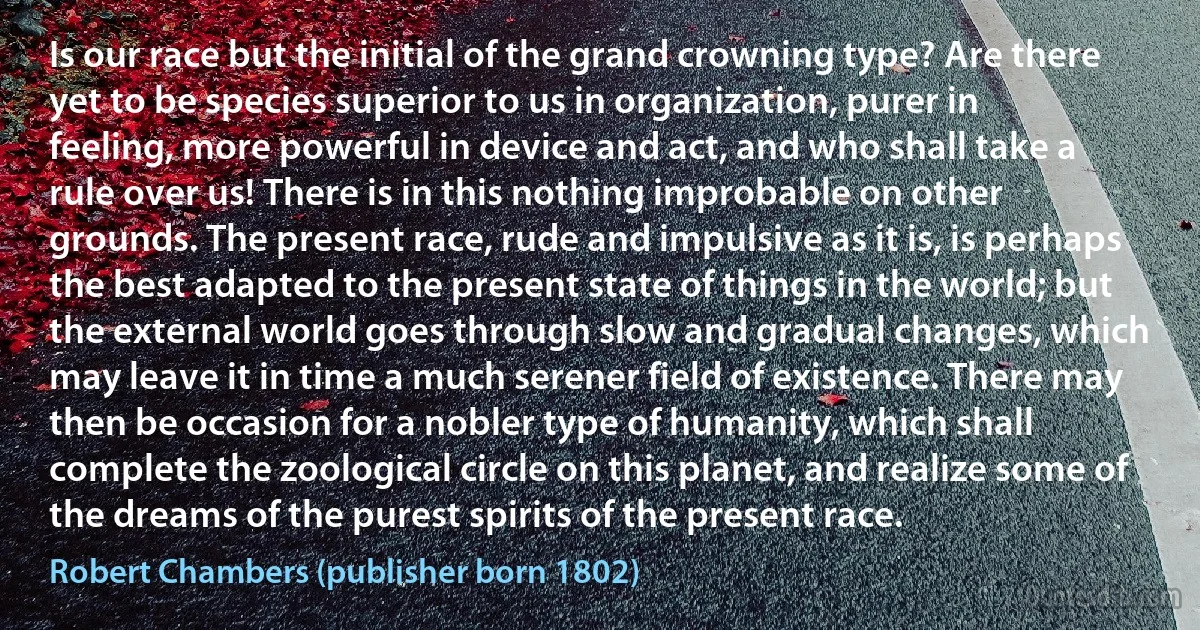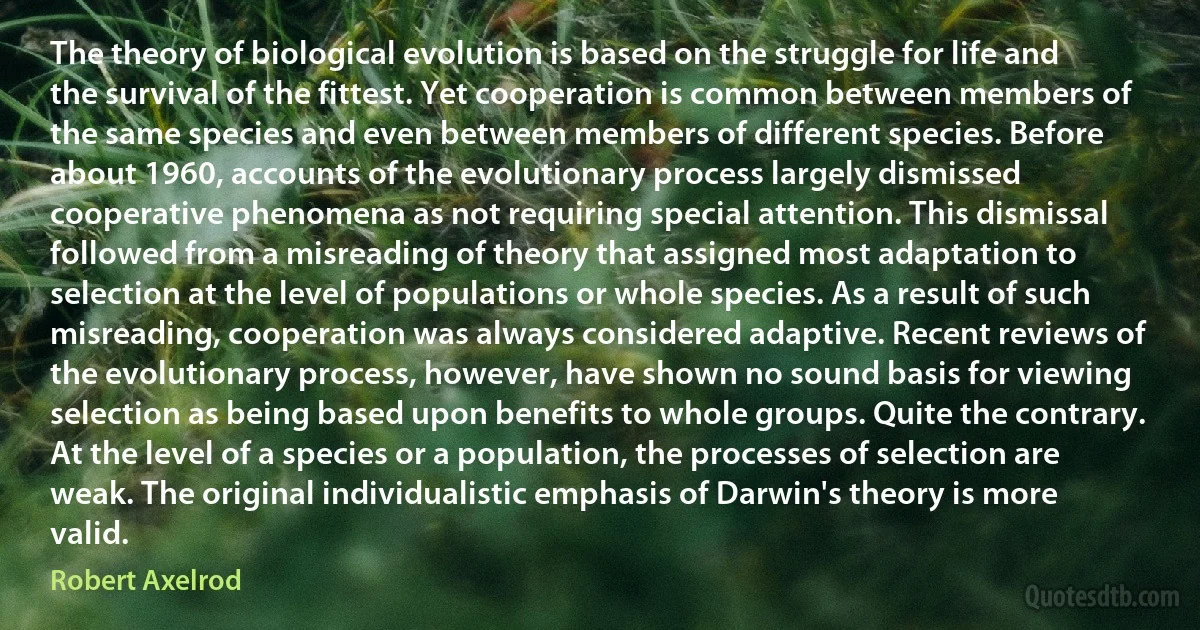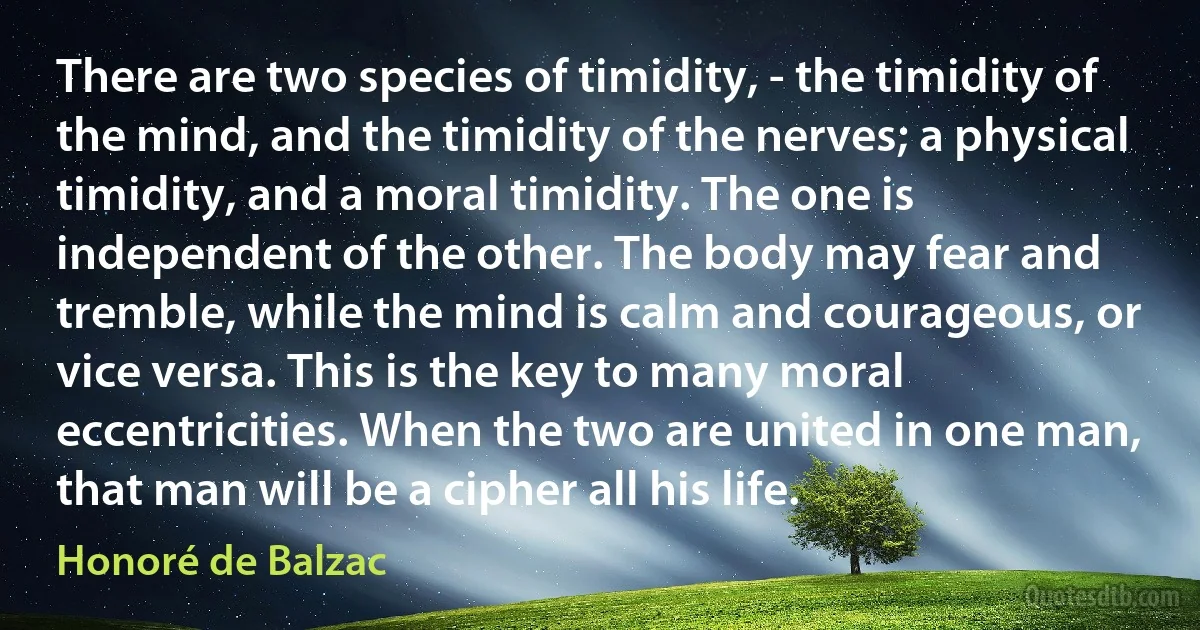Species Quotes - page 55
Dr. Plot, in his 'Natural History of Oxfordshire.' (1677) attributed to a 'plastic virtue latent in the earth' the origin of fossil shells and fishes; and Lister, to his accurate account of British shells, in 1678, added the fossil species, under the appellation of turbinated and bivalve stones. 'Either,' said he, 'these were terriginous, or if otherwise, the animals they so exactly represent have become extinct. This writer appears to have been the first who was aware of the continuity over large districts of the principal groups of strata in the British series, and who proposed the construction of regular geological maps.

Charles Lyell
None of the observations are more in point, as bearing on the doctrine of what Hooker terms 'creation by variation,' than the great extent to which the internal characters and properties of plants, or their physiological constitution are capable of being modified, while they exhibit externally no visible departure from the normal form. ...When several of these internal or physiological modifications are accompanied by variation in size, habits of growth, colour of the flowers, and other external characters, and these are found to be constant in successive generations, botanists may well begin to differ in opinion as to whether they ought to regard them as distinct species or not.

Charles Lyell
I endeavoured to sketch out (and it was, I believe, the first systematic attempt to accomplish such a task) the laws which govern the extinction of species, with a view of showing that the slow, but ceaseless variations, now in progress in physical geography, together with the migration of plants and animals into new regions, must, in the course of ages, give rise to the occasional loss of some of them, and eventually cause an entire fauna and flora to die out; also, that we must infer, from geological data, that the places thus left vacant from time to time, are filled up without delay by new forms, adapted to new conditions, sometimes by immigration from adjoining provinces, sometimes by new creations. Among the many causes of extinction enumerated by me, were the power of hostile species, diminution of food, mutations in climate, the conversion of land into sea, and of sea into land, &c.

Charles Lyell
We may understand why the species of the same genus, or genera of the same family, resemble each other more nearly in their embryonic than in their more fully developed state, or how it is that in the eyes of most naturalists the structure of the embryo is even more important in classification than that of the adult, 'for the embryo is the animal in its less modified state, and in so far it reveals the structure of its progenitor. In two groups of animals, however much they may at present differ from each other in structure and habits, if they pass through the same or similar embryonic stages, we may feel assured that they have both descended from the same or nearly similar parents, and are therefore in that degree closely related. Thus community in embryonic structure reveals community of descent, however much the structure of the adult may have been modified.

Charles Lyell
The definition, I suppose, would be many, many organisms across many, many different groups. And that is, really, what we are seeing and that is what makes scientists fear ... that we're in a mass extinction. ... About a quarter of all mammals are considered endangered. ... About 40 percent of all amphibians are considered endangered. But we're also seeing organisms, invertebrates, for example, are endangered ... many species of reef-building corals are now considered very, very endangered...

Elizabeth Kolbert
There are no gods (including God). Like all species, ours is a product of nature. This is not something either to celebrate or to mourn. But it can prove a transformational and mind-opening experience to put all gods, religions and supernatural enthusiasms aside and to explore the world from the point of view of a human being who lives, dies, and is as natural as a tiger or a dove.

Eric Maisel
One of the odd aspects of animal mistreatment in the U.S. is that species regarded as more intelligent and emotionally complex - dogs, dolphins, cats, primates - generally receive more public concern and more legal protection. Yet pigs – among the planet's most intelligent, social, and emotionally complicated species, capable of great joy, play, love, connection, suffering and pain, at least on a par with dogs - receive almost no protections, and are subject to savage systematic abuse by U.S. factory farms.

Glenn Greenwald
In the animal world we have seen that the vast majority of species live in societies, and that they find in association the best arms for the struggle for life: understood, of course, in its wide Darwinian sense - not as a struggle for the sheer means of existence, but as a struggle against all natural conditions unfavourable to the species. The animal species, in which individual struggle has been reduced to its narrowest limits, and the practice of mutual aid has attained the greatest development, are invariably the most numerous, the most prosperous, and the most open to further progress. The mutual protection which is obtained in this case, the possibility of attaining old age and of accumulating experience, the higher intellectual development, and the further growth of sociable habits, secure the maintenance of the species, its extension, and its further progressive evolution. The unsociable species, on the contrary, are doomed to decay.

Peter Kropotkin
Two invasive species in particular have caused serious concern: Burmese pythons, and New Yorkers. The New Yorkers have been coming for years, which is weird because pretty much all they do once they get to Florida is bitch about how everything here sucks compared to the earthly paradise that is New York. They continue to root, loudly, for the Jets, the Knicks, the Mets, and the Yankees; they never stop declaring, loudly, that in New York the restaurants are better, the stores are nicer, the people are smarter, the public transportation is free of sharks, etc. The Burmese pythons are less obnoxious, but just as alarming in their own way. These are snakes that started out as pets of Miami residents, until one day these residents stopped smoking crack and said, "Jesus H. Christ! We're living with a giant snake!"

Dave Barry
The people who devised physical theory and constructed jump engines were not the same people who made political decisions, or who allowed themselves to be swept up by the current media craze, or to be ruled by centuries-old traditions that might once have served to hold nations together but now had become counterproductive.
Don't assume that a species is intelligent because it produces intelligent individuals.

Jack McDevitt
I was convinced that Lake Como was a large basin of water similar to the Tahoe, also surrounded by immense mountains whose slopes reach the shores, but here the lake is not a basin, since the banks are articulated like those of a stream and is a quarter or two thirds wide of the Mississippi. Along the coast there is not a single strip of flat land, but endless chains of mountains which suddenly emerge from the lake surface and rise towards the sky for one hundred or two hundred feet, constantly varying in shape. The rocky ridges are covered with numerous plant species and dotted with white villas that peek through lush foliage. Even on the top of the promontory we saw pretty little houses perched on picturesque pinnacles, more than a thousand feet above our heads.

Mark Twain
The Sacred Mirrors speak to our highest aspirations as a species: universal compassion, respect for all life, a deep appreciation of all cultures and wisdom traditions, awakened consciousness and a full flowering of our human potential. In a "chapel of beauty," they could contribute to the radical raising of awareness we so desperately need if we are to successfully navigate our way to a saner, more loving and life-affirming civilization.

Alex Grey
You can find things in the traditional religions which are very benign and decent and wonderful and so on, but I mean, the Bible is probably the most genocidal book in the literary canon. The God of the Bible - not only did He order His chosen people to carry out literal genocide - I mean, wipe out every Amalekite to the last man, woman, child, and, you know, donkey and so on, because hundreds of years ago they got in your way when you were trying to cross the desert - not only did He do things like that, but, after all, the God of the Bible was ready to destroy every living creature on earth because some humans irritated Him. That's the story of Noah. I mean, that's beyond genocide - you don't know how to describe this creature. Somebody offended Him, and He was going to destroy every living being on earth? And then He was talked into allowing two of each species to stay alive - that's supposed to be gentle and wonderful.

Noam Chomsky
[T]he first characteristic of the human species is man's ability, as a rational being, to establish character for himself, as well as for the society into which nature has placed him. This ability, however, presupposes an already favorable natural predisposition and an inclination to the good in man, because the evil is really without character (since it is at odds with itself, and since it does not tolerate any lasting principle within itself)

Immanuel Kant
Economic theory as derived from Adam Smith assumes first that homo economicus acts with perfect optimality on complete information, and second that when many of the species homo economicus do that, their actions add up to the best possible outcome for everybody. Neither of these assumptions stands up long against the evidence.

Adam Smith
There are genes that have not changed much since the very first single-celled creatures populated the primeval ooze. There are genes that were developed when our ancestors were worm-like. There are genes that must have first appeared when our ancestors were fish. There are genes that exist in their present form only because of recent epidemics of disease. And there are genes that can be used to write the history of human migrations in the last few thousand years. From four billion years ago to just a few hundred years ago, the genome has been a sort of autobiography for our species, recording the important events as they occurred.

Matt Ridley
We seem to have quite a few problems: global climate change, peak oil, overpopulation, collapsing fisheries, desertification, wealth inequality, species extinctions, freshwater shortages, hapless governments, deforestation, disease epidemics, and agricultural failures top the list. ...our civilizations have been in similar situations before ...a long list of civilizations from the Maya to the Romans all collapsed. The precedent is set...

Steve Hallett



